
The cinema of the Soviet Union includes films produced by the constituent republics of the Soviet Union reflecting elements of their pre-Soviet culture, language and history, albeit they were all regulated by the central government in Moscow. Most prolific in their republican films, after the Russian Soviet Federative Socialist Republic, were Armenia, Azerbaijan, Georgia, Ukraine, and, to a lesser degree, Lithuania, Belarus and Moldavia. At the same time, the nation's film industry, which was fully nationalized throughout most of the country's history, was guided by philosophies and laws propounded by the monopoly Soviet Communist Party which introduced a new view on the cinema, socialist realism, which was different from the one before or after the existence of the Soviet Union.
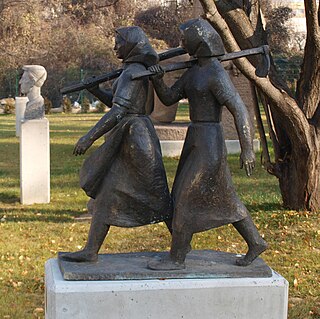
Socialist realism is a style of idealized realistic art that was developed in the Soviet Union and was the official style in that country between 1932 and 1988, as well as in other socialist countries after World War II. Socialist realism is characterized by the depiction of communist values, such as the emancipation of the proletariat. Despite its name, the figures in the style are very often highly idealized, especially in sculpture, where it often leans heavily on the conventions of classical sculpture. Although related, it should not be confused with social realism, a type of art that realistically depicts subjects of social concern, or other forms of "realism" in the visual arts. Socialist realism was made with an extremely literal and obvious meaning, usually showing an idealized USSR. Socialist realism was usually devoid of complex artistic meaning or interpretation.
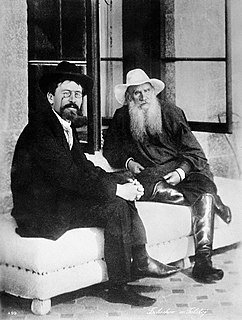
Russian literature refers to the literature of Russia and its émigrés and to Russian-language literature. The roots of Russian literature can be traced to the Middle Ages, when epics and chronicles in Old East Slavic were composed. By the Age of Enlightenment, literature had grown in importance, and from the early 1830s, Russian literature underwent an astounding golden age in poetry, prose and drama. Romanticism permitted a flowering of poetic talent: Vasily Zhukovsky and later his protégé Alexander Pushkin came to the fore. Prose was flourishing as well. Mikhail Lermontov was one of the most important poets and novelists. The first great Russian novelist was Nikolai Gogol. Then came Ivan Turgenev, who mastered both short stories and novels. Fyodor Dostoevsky and Leo Tolstoy soon became internationally renowned. Other important figures of Russian realism were Ivan Goncharov, Mikhail Saltykov-Shchedrin and Nikolai Leskov. In the second half of the century Anton Chekhov excelled in short stories and became a leading dramatist. The beginning of the 20th century ranks as the Silver Age of Russian poetry. The poets most often associated with the "Silver Age" are Konstantin Balmont, Valery Bryusov, Alexander Blok, Anna Akhmatova, Nikolay Gumilyov, Sergei Yesenin, Vladimir Mayakovsky, and Marina Tsvetaeva. This era produced some first-rate novelists and short-story writers, such as Aleksandr Kuprin, Nobel Prize winner Ivan Bunin, Leonid Andreyev, Fyodor Sologub, Yevgeny Zamyatin, Alexander Belyaev, Andrei Bely and Maxim Gorky.

The USSR State Prize was the Soviet Union's state honor. It was established on September 9, 1966. After the breakup of the Soviet Union, the prize was followed up by the State Prize of the Russian Federation.

Yury Karlovich Olesha was a Russian and Soviet novelist. He is considered one of the greatest Russian novelists of the 20th century, one of the few to have succeeded in writing works of lasting artistic value despite the stifling censorship of the era. His works are delicate balancing acts that superficially send pro-Communist messages but reveal far greater subtlety and richness upon a deeper reading. Sometimes, he is grouped with his friends Ilf and Petrov, Isaac Babel, and Sigismund Krzhizhanovsky into the Odessa School of Writers.
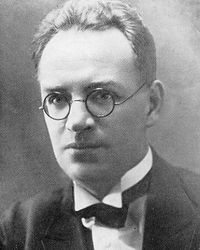
Boris Andreyevich Pilnyak was a Russian and Soviet writer who was executed by the Soviet Union on false claims of plotting to kill Joseph Stalin and Nikolay Yezhov.
The term Soviet Nonconformist Art refers to Soviet art produced in the former Soviet Union from 1953 to 1986 outside of the rubric of Socialist Realism. Other terms used to refer to this phenomenon are "underground art" or "unofficial art".

Eduard Georgyevich Bagritsky was an important Russian and Soviet poet of the Constructivist School.
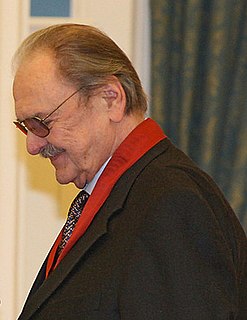
Yury Vasilyevich Yakovlev was a Soviet and Russian actor. People's Artist of the USSR (1976).
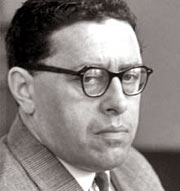
Yury Valentinovich Trifonov was a leading representative of the so-called Soviet "Urban Prose". He was considered a close contender for the Nobel Prize for Literature in 1981.
"Engineers of the human soul" was a term applied to writers and other cultural workers by Joseph Stalin.

Yury Petrovich Vlasov was a Soviet and Russian heavyweight weightlifter, writer and politician. He competed at the 1960 and 1964 Olympics and won a gold medal in 1960 and a silver in 1964; at both games, he was the Olympic flag bearer for the Soviet Union. During his career, Vlasov won four world titles and set 31 ratified world records. He retired in 1968 and became a prominent writer and later a politician. He was a member of the Congress of People's Deputies of the Soviet Union (1989) and then of the Russian State Duma (1993) and took part in the 1996 Russian presidential election.
Arkadiy Viktorovich Belinkov was a Russian writer and literary critic.
Zhdanov or Zhdanova is a surname. Notable people with the surname include:
Yuri Andreyevich Zhelyabuzhsky was a Russian and Soviet cinematographer, film director, screenwriter and animator, film theorist and professor at VGIK.

The Uprising of Bolotnikov, in Russian historiography called the Peasant War under the Leadership of Ivan Bolotnikov , was a major peasant, Cossack, and noble uprising of 1606–1607 led by Ivan Bolotnikov and several other leaders. At the time of the highest point of the uprising, more than 70 cities in the south and center of Russia were under the control of the rebels.

Vladimir Stepanovich Babichev was a Soviet and Russian politician and former Chief of Staff of the Russian Government (1994-1998).
Marian Schwartz is an American translator of contemporary Russian literature. She is the principal English translator of the author Nina Berberova and has translated over 70 books of fiction, history, biography, and criticism into English. She is the recipient of two translation fellowships from the National Endowment for the Arts. Based in Austin, Texas, she is the former president of the American Literary Translators Association.












